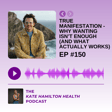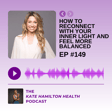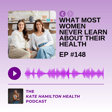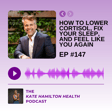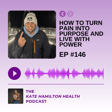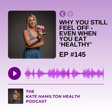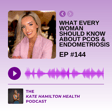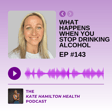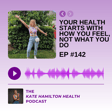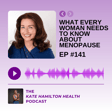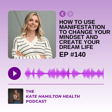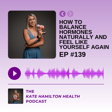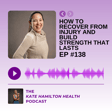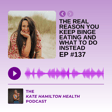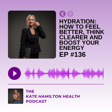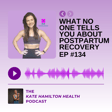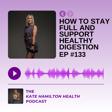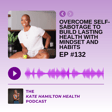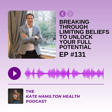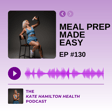
#135: Aisling Fox: Hormones 101: What’s really going on and how to balance them
In this episode of the Kate Hamilton Health Podcast, I had the absolute pleasure of sitting down with Aisling Fox, a powerhouse nutritional therapist, herbalist, and the founder of AOK Nutrition. We chatted all things women's health - from hormones and fertility to the long-term effects of extreme dieting, the power of herbal medicine, and the small but mighty habits that support hormone balance and stress management. Aisling brings a refreshing and honest perspective to what it really takes to support our bodies in a holistic and sustainable way.
If you've ever felt overwhelmed by your hormones, struggled with your menstrual cycle, or questioned if your stress is affecting your fertility, this episode is for you. Aisling shares practical insights from her Dublin-based clinic where she blends traditional herbalism with science-backed nutrition. We also chat about the often misunderstood role of progesterone, why losing your period is a big deal, and how bodybuilding or photoshoot prep can impact your long-term health. Her personalised approach to hormone health is empowering and incredibly actionable.
EPISODE HIGHLIGHTS:
[0:00] - Welcome and intro to this week’s guest, Aisling Fox of AOK Nutrition
[0:46] - Why women's health needs more honest conversations
[1:11] - Understanding hormonal imbalances and what your body is trying to tell you
[3:04] - Aisling's journey into nutritional therapy and herbalism
[5:44] - Hormone 101: the foundational things we all should know
[7:13] - How lifestyle choices directly affect your hormone health
[15:08] - The power of food: nutrition strategies that support healthy hormones
[21:07] - Intermittent fasting: is it hurting or helping your hormones?
[26:16] - How my own coaching supports women alongside practitioners like Aisling
[32:34] - Why healthy fats are crucial for hormonal balance
[34:10] - The darker side of bodybuilding and photoshoot prep culture
[36:14] - Why losing your cycle is a red flag, not a badge of honor
[40:28] - Navigating fertility challenges and holistic support options
[42:10] - When blood tests matter and how to interpret them
[53:07] - How herbal medicine plays a powerful role in personalized wellness
[59:53] - Final thoughts and where to find Aisling online
Links & Resources:
- Connect with me on Instagram here
- Connect with Aisling on Instagram here
- Learn more about KHH coaching here
If you enjoyed this episode, please subscribe, leave a review, and share it with friends who might benefit. For more health and fitness tips, follow me on Instagram and TikTok @katehamiltonhealth.
Music b LiQWYD Free download: hypeddit.com/link/xxtopb [http://hypeddit.com/link/xxtopb] Promoted by FreeMusicPromo [https://www.youtube.com/channel/UCbycji-eySnM3WD8mbxPUSQ] / @freemusicpromo
